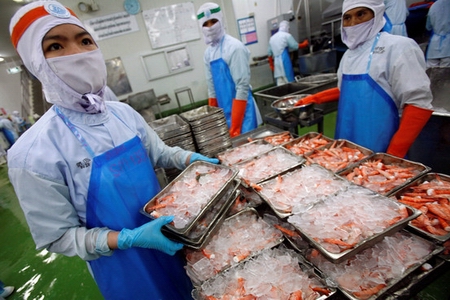
Asia is fighting a new disease that has reduced shrimp output in Thailand as much as 40%, driving prices higher for Western restaurants and retailers.
The disease appeared in Thailand, the world's largest shrimp exporter, late last year after ravaging shrimp stocks in China in 2009 and then in Vietnam. With production plunging, shrimp prices in the U.S. have jumped 20% in recent months, according to Thailand's leading exporter.
Grocery stores and restaurant chains in the U.S. say they hope the shrimp shortage will be short-lived and manageable, though they may have to raise prices to avoid a hit to earnings.
Landry's Inc., owner of seafood chains including Bubba Gump Shrimp Co. and McCormick & Schmick's, is getting shrimp from other countries and considering making menu changes. "We may selectively raise prices," says Chief Financial Officer Rick Liem.
The United Nations says the bacterial infection, called early mortality syndrome or EMS, poses no significant threat to human health.
But the disease is deadly to shrimp; in many outbreaks, it can kill all affected crustaceans before they reach maturity and can reproduce, providing a powerful reminder about how animal diseases can threaten food security and prices.
As EMS affected East Asian shrimp producers, competitors such as India and Ecuador have been attempting to pick up the slack, though their output still trails that of Thailand.
But researchers at Mahidol University in Thailand says EMS could appear anywhere in the world, since the bacterium lives in natural waters.
The U.S. relies on imports for most of its shrimp supply and Thailand is the biggest source, accounting for about a quarter of the imports in 2012.
But U.S. shrimp imports from Thailand fell 27% last year and dropped another 23% in January through April, according to Urner Barry, a publisher specializing in agricultural markets.
"They're down from a down year, so the impact is pretty big," says Paul Brown Jr., president of Urner Barry.
A spokesman for supermarket chain Kroger Co. KR -0.42% says the shortage is "affecting all retailers, including us" and that "it will have an economic impact," but didn't elaborate on how that will affect customers.
Darden Restaurants Inc., DRI -0.24% which operates the Red Lobster and Olive Garden restaurant chains, says 60% of its shrimp costs are covered by contract through the company's fiscal first half, which runs through November, and that it expects shrimp costs to level out in the second half. "We have no plans to raise shrimp prices," spokesman Rich Jeffers says.





